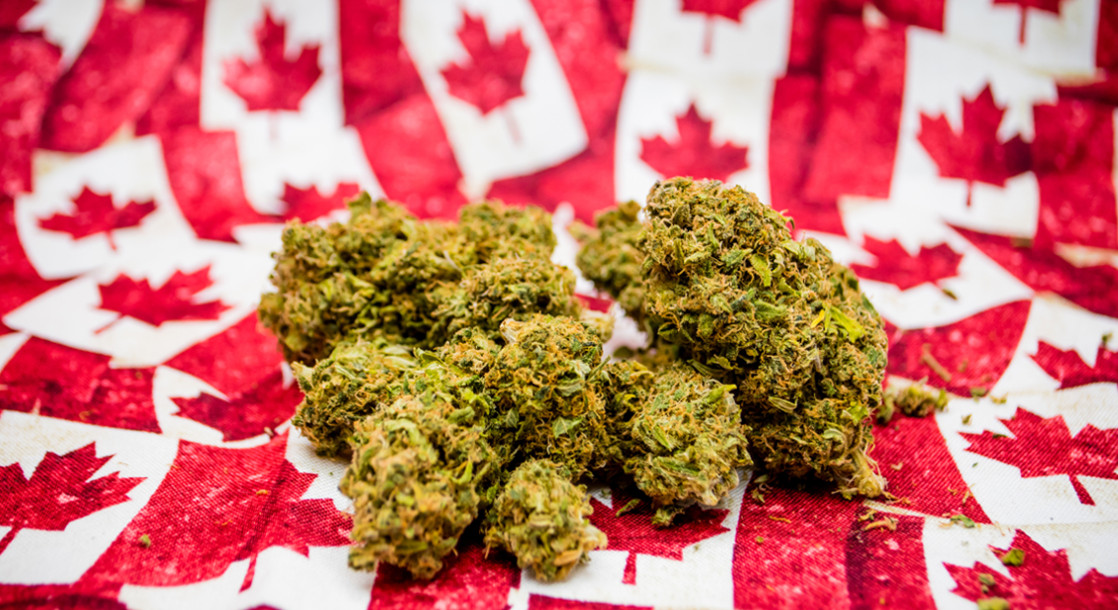This week, the world will witness a watershed moment in weed history, as Canada becomes Earth’s second (and largest) country to legalize the sale and use of recreational cannabis. Although marijuana will technically be legal on Wednesday, many Canadian pot shops aren’t yet ready to open their doors, and government officials will likely spend the next several years amending, enforcing, and adding to relevant regulations. Law enforcement will also need time to adjust to the country’s new drug policy. Police are currently working on the best way to keep stoned drivers off the road, while border authorities are warning Canadians that any involvement with legal weed could get them banned from the U.S. for life.
In the United States, cannabis remains classified as a dangerous Schedule I drug, and an overarching federal prohibition on the plant means that each state must roll out their own laws in order to legalize it. This issue could finally be resolved if President Trump makes good on a recent promise to support a bill protecting states' rights to legalize weed, but individual states like Utah and Pennsylvania are still pushing forward with their own efforts at cannabis reform regardless of Trump’s uncertain pledge. Recreational cannabis has been legal in several U.S. states for six years now, but some states are still going back to the drawing board to tweak their regulations, as Washington State is currently doing with its new rules for edibles. For more on these stories, read on…
Canada Officially Legalizes Cannabis on Wednesday
Canada's road to legal weed began in late 2015 with the election of Prime Minister Justin Trudeau, who promised to bring legal cannabis to the Great White North. The Trudeau administration pushed for a tentative legalization date of July 1st, 2018, but lawmakers were unable to agree on a finalized bill early enough to make this happen. The House of Commons signed off on the bill last December, and after a failed attempt to add dozens of new restrictions to the legislation, the country's Senate finally approved the bill in June.
As of Wednesday, October 17th, Canadian adults will be allowed to legally purchase and possess up to 30 grams of pot in public (with no limit at home). The sale and consumption of edibles and concentrates remains prohibited for another year, giving time for lawmakers to draft regulations concerning their packaging and distribution. Every province has its own laws regarding how and where pot can be legally sold: some provinces will only allow government-operated stores, while others permit privately-owned retail establishments, and several will allow a mix of the two models.
Although retail sales are technically legal, most provinces are still working on the licensing and regulating process, and relatively few pot shops will be actually open for business this week. Some Canadians will have to wait months or even years before they see a retail store open in their neighborhood. In the meantime, some provinces are allowing adults to purchase cannabis online via government-operated websites, and all provinces other than Quebec and Manitoba allow each household to grow up to four pot plants.
U.S. Border Officials Will Allow Entry to Canada's Cannabis Employees
Canada's decision to legalize a plant that remains prohibited throughout most of the world places it in violation of several international treaties, and Canadians must now be extra careful about disclosing their involvement with legal cannabis to border authorities in other countries. This remains especially true for the United States, where border police have threatened to permanently ban any Canadian who admits to smoking pot even once.
This summer, anxieties rose after it was reported that U.S. Customs and Border Protection (CBP) officials were also planning on banning any Canadian who worked in the pot industry, even if they never personally touched the plant. To make matters worse, CBP officials reportedly searched the websites of Canadian cannabis companies to identify employees who should be denied entry. Fortunately, a CBP announcement eased some of these tensions this week, explaining that they will now allow Canadian cannabis workers to enter the country — but only for non-business-related purposes.
Republican Congressman Says Trump Will Tackle Cannabis Reform After Midterms
As Canada prepares to celebrate the end of marijuana prohibition, some are wondering if nationwide cannabis reform will soon spread to the country’s largest neighbor. Last week, Rep. Dana Rohrabacher (R-CA) announced that he received assurances that President Trump intends to address the disconnect between the growing number of state-legal cannabis programs and federal prohibition. During his campaign, Trump frequently expressed his support for medical marijuana, and as recently as this year, promised to support bipartisan legislation that would allow individual states to legalize medical or recreational pot without fear of federal intervention.
In a recent interview, Rohrabacher said that White House officials told him that the president intends to make good on these promises following next month's midterm elections. No further reports have surfaced on the president's plans, but Rohrabacher said that he expects to see Congress address cannabis reform during the 2019 legislative session, possibly as soon as next spring.
Lawmakers in Utah and Pennsylvania Advance Cannabis Reform Bills
During this year's midterm election, Utah residents will vote on Proposition 2, a ballot measure that would create a comprehensive medical marijuana program. A recent poll found that 64% of Beehive State voters support the measure, but last week, supporters and opponents of the ballot initiative proposed a unique compromise that would put the production and distribution of medical cannabis directly under control of the state, which would be a first for the U.S. if successful.
The compromise deal is likely to go into effect whether or not voters approve the ballot measure, as it has full support from both Gov. Gary Herbert and the Church of Jesus Christ of Latter-Day Saints, a powerful presence in the state. If the measure does pass, legislators plan to amend it to include their new restrictions, and if it fails, legislators will pass the compromise bill as is. However, if Proposition 2 does succeed, voters may be able to pressure legislators to allow the measure to stand unaltered, and advocates are working overtime to encourage voter support in next month’s election.
In Pennsylvania, a key legislative committee just voted to advance a bill that would decriminalize the possession of 30 or fewer grams of weed. Instead of facing a $500 fine, possible drivers' license suspension, and up to 30 days in jail, those busted with small amounts of bud would only have to pay a $300 fine, with no risk of time behind bars. The bill must still pass the state legislature, but Gov. Tom Wolf has indicated that he’s willing to sign it into law if it does pass.
Washington State Will Ban Pot-Infused Candies Unless Producers Come Up With an Alternative
While most canna-legal states have been gradually increasing the number of cannabis products for sale, Washington is moving in the opposite direction. Recreational cannabis has been legal in the Evergreen State since 2012, but last week, the state released a new set of regulations that effectively ban most forms of cannabis edibles due to concerns that these products could attract children. Officials mandated that all edible producers resubmit their products for review by next April, but advised that pot-infused hard candies, gummies, fruit chews, or colorful chocolates would no longer be approved.
Edible manufacturers across the state — most of whom have invested hundreds of thousands of dollars into remaining compliant with the state's previous regulations — were understandably outraged by the decision. Industry groups demanded that the state rescind its order immediately, and regulators have agreed to hear them out. The state is now giving the cannabis industry one month to voice their concerns over the issue and propose an alternative solution.
Next time we’ll check in on how Canada’s first week with legal weed went, along with the week’s other major developments in marijuana. In the fight for pot reform, knowledge is power, so stay tuned!











